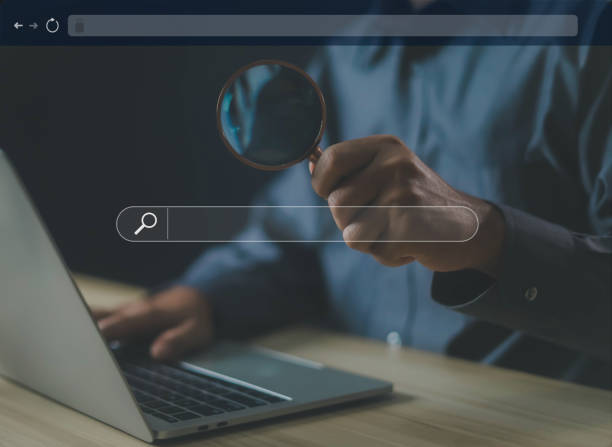Introduction to the Concept of SEO and Its Importance

Search Engine Optimization or #SEO is a process aimed at improving the visibility of a website or web page in the organic search results of search engines like Google.
It is a #digital_marketing_strategy that focuses on increasing the quality and quantity of website traffic through search engine results.
In today’s highly competitive world, a strong online presence is crucial for any business or individual looking to reach a wider audience.
Without an effective SEO strategy, even the best content or product can get lost among the vast amount of information available on the internet.
The increasing importance of SEO in digital marketing is due to its role in attracting targeted and free traffic.
Organic traffic refers to visitors who directly enter your site through searches on Google or other search engines, without you having paid for advertising.
This type of traffic is not only more sustainable but usually also has a higher conversion rate, as users are actively looking for the information or products you offer.
Therefore, investing in SEO is considered a strategic decision for the long-term growth of any business that wants to succeed in the online space.
This approach helps you improve your competitive position and differentiate yourself from competitors.
Tired of losing customers due to poor e-commerce website design? With Rasaweb, solve this problem forever!
✅ Increase sales and visitor-to-customer conversion rates
✅ Smooth and engaging user experience for your customers⚡ Get Free Consultation
Main Types of SEO and Their Distinctions

To comprehensively understand how SEO works and how to use it effectively, it is necessary to become familiar with its main types and their differences.
Generally, SEO can be divided into three main categories: On-Page SEO, Off-Page SEO, and Technical SEO.
Each of these sections focuses on different aspects of a website and together they form a comprehensive optimization strategy.
On-Page SEO refers to all actions performed within your website to improve its ranking in search results.
This includes optimizing content, using appropriate keywords in titles, meta descriptions, and body text, optimizing images, internal link structure, and improving user experience.
Informative and guiding content in this section is crucial, as it helps search engines and users better understand your website.
In contrast, Off-Page SEO refers to factors outside your website that influence its ranking.
The most important aspect of Off-Page SEO is backlink building (inbound links from other sites).
The quality and quantity of backlinks indicate your website’s credibility and authority in the eyes of search engines.
Social media activity, influencer marketing, and media coverage can also indirectly affect Off-Page SEO.
This part of SEO requires a strategic approach to attract natural and high-quality links.
Technical SEO also deals with optimizing your website’s technical infrastructure so that search engines can easily crawl and index it.
This includes improving site loading speed, mobile compatibility, URL structure, Robots.txt file, XML sitemap, and the use of structured data.
A website with a strong technical structure facilitates the SEO process for search engines and provides a better user experience.
All three types of SEO complement each other, and neglecting any of them can prevent achieving desired ranking results.
Keyword Research: The Backbone of SEO

Keyword research is the foundation of any successful SEO strategy.
This process involves finding and analyzing the words and phrases that users employ when searching on search engines.
The primary goal is to better understand your audience and their needs, enabling you to produce content that precisely answers their questions and desires.
Expert and accurate keyword research helps you identify keywords that not only have high search volume but are also relevant to your business and can drive targeted traffic to your site.
This part of SEO requires appropriate tools and a deep understanding of the market.
There are various types of keywords, including short-tail keywords, which are typically one or two words long and have high search volume but also high competition (e.g., “SEO” or “marketing”).
In contrast, long-tail keywords are longer phrases (e.g., “how to improve WordPress site SEO?”) that have lower search volume but more precisely indicate user intent, and thus have less competition.
The importance of long-tail keywords lies in higher conversion rates and attracting targeted traffic.
Tools like Google Keyword Planner, Ahrefs, and SEMrush help you discover relevant keywords, check their search volume, assess their competitiveness, and find hidden keywords.
The table below lists some important criteria in keyword research:
| Criterion | Description | Importance in SEO |
|---|---|---|
| Search Volume | Number of times a keyword is searched per month | Indicates traffic potential |
| Keyword Difficulty | Level of difficulty to rank for that keyword | Determines strategy and ranking timeline |
| User Intent | User’s goal in searching for that keyword (informational, commercial, navigational) | Producing relevant content and increasing conversion rate |
Choosing appropriate keywords in SEO does not solely mean finding high-volume search phrases, but rather finding phrases that are most relevant to your target audience and can help achieve your business objectives.
Content Optimization and Valuable Content Creation

After keyword research, the next step in the SEO process is the creation and optimization of valuable content.
Content is king in SEO, and without high-quality and relevant content, no SEO strategy can succeed.
Your content should not only be attractive and useful for search engines, but more importantly, for users.
This includes producing educational, explanatory, and guiding content that answers users’ questions and addresses their needs.
For content optimization for SEO, there are several key points.
First, researched keywords should be naturally and intelligently incorporated into the content.
This includes using keywords in the main title (H1), subheadings (H2, H3), introductory and concluding paragraphs, and throughout the text.
Over-stuffing the text with keywords (Keyword Stuffing), which can harm your SEO ranking, should be avoided.
Your content should be comprehensive yet fluid, providing complete information on the topic.
Content structure is also important for SEO and user experience.
Using titles and subtitles, short paragraphs, bulleted lists, and relevant images enhances text readability.
Furthermore, internal linking to other related pages on your website not only helps search engines understand your site’s structure but also encourages users to stay longer on the site.
Educational and explanatory content plays a crucial role in building user trust and turning your website into a credible reference.
For example, a website can, by providing step-by-step guides on how to use a product, not only educate users but also send positive SEO signals to search engines.
The ultimate goal of content creation in SEO is to produce content that is not only understandable by search engines but can also create real value for the audience and guide them towards the desired action (such as purchasing or signing up).
Does your current e-commerce website design lead to lost customers and sales?
Rasaweb is your solution, with modern and user-friendly e-commerce website designs!
✅ Significant increase in conversion rates and sales
✅ Strong branding and building customer trust
⚡ Get a free e-commerce website design consultation from Rasaweb!
Technical SEO: A Vital Role in Visibility

Technical SEO is another essential part of the SEO strategy that is often overlooked but plays a vital role in your website’s visibility in search results.
This section focuses on optimizing your website’s technical infrastructure so that search engines can easily crawl, index, and ultimately rank your pages.
Without a strong technical foundation, even the best content and backlink strategy may not yield desirable results.
One of the most important aspects of Technical SEO is site loading speed.
Both users and search engines value speed.
Websites that load quickly offer a better user experience and have lower bounce rates.
Tools like Google PageSpeed Insights help you identify and resolve your site’s speed issues.
Image optimization, caching, and file compression are among the solutions for improving speed.
Mobile-Friendliness is also a crucial ranking factor, especially given the increasing use of mobile devices for searching.
Google uses Mobile-First indexing, meaning it prioritizes the mobile version of your site to determine its ranking in search results.
URL structure, the Robots.txt file (which tells search engines which parts of the site to crawl and which to exclude), and the XML sitemap (which provides search engines with a list of all important pages on your site) are also important elements of Technical SEO.
The use of Canonical Tags to prevent duplicate content issues and the implementation of an SSL certificate for security (HTTPS) are also essential.
These actions, although they may be invisible to users, directly impact your website’s ability to be seen in search results.
A specialized technical SEO audit can uncover hidden website issues that hinder its growth and facilitate overall SEO optimization.
Backlink Building and Authority Acquisition Strategies

Backlink building is one of the main pillars of Off-Page SEO and a very important ranking factor for search engines.
Backlinks (or inbound links) refer to links that point from one website to another.
Search engines like Google consider backlinks as “votes of confidence” from other sites.
The more numerous and higher quality backlinks a site receives, the more credible and authoritative it is considered by search engines, and the higher its chance of ranking for relevant keywords.
This aspect of SEO requires a strategic and time-consuming approach.
However, not every backlink is valuable.
Quality over quantity is preferred in backlink building.
Backlinks from reputable sites, relevant to your industry, and with high Domain Authority are far more valuable than links from spammy or irrelevant sites.
Backlink acquisition strategies should be ethical and “White-Hat SEO”.
Techniques such as unnatural link exchanges or buying backlinks can lead to Google penalizing your site and seriously damaging your SEO credibility.
Some effective and ethical strategies for acquiring backlinks include:
- Creating high-quality and shareable content: Excellent content naturally attracts links.
- Educational and explanatory content: These types of content are good references for linking.
- Guest Posting: Writing articles for other sites in your industry and including a link to your own site.
- Broken Link Building: Finding broken links on other sites and suggesting your content as a replacement.
- Digital PR: Generating media coverage for your business that leads to mentions and linking.
Note that the SEO process for gaining authority and backlinks requires continuous time and effort.
This aspect of SEO, alongside other aspects, significantly helps improve your site’s position in search results.
Measuring and Analyzing SEO Performance

After implementing SEO strategies, the next crucial step is measuring and analyzing their performance.
SEO analysis helps you evaluate the effectiveness of your efforts, identify strengths and weaknesses, and adjust your future strategies based on real data.
Without accurate measurement, continuous improvement in SEO will be nearly impossible.
Several tools are available for this purpose, among the most important of which are Google Analytics and Google Search Console.
Google Analytics provides data related to website traffic, user behavior, conversion rates, and traffic sources.
This tool shows you how many visitors have entered your site through organic search, how long they have spent on the site, and what actions they have taken.
Google Search Console is also an essential tool for any SEO specialist.
This tool allows you to monitor your site’s performance in search results, view the keywords users use to find your site, identify issues related to page crawling or indexing, and even disavow spam links.
This analytical tool provides vital information directly from Google.
Key metrics you should monitor in your SEO analysis include the following:
- Organic Traffic: The number of visitors who come to your site through search engines.
- Keyword Ranking: The position of your pages in search results for target keywords.
- Bounce Rate: The percentage of visitors who leave the site after viewing only one page.
- Conversion Rate: The percentage of visitors who complete the desired action (e.g., purchase, sign-up).
- Click-Through Rate (CTR): The percentage of your website’s impressions in search results that resulted in a click.
The table below lists a few more important metrics for monitoring SEO performance:
| Metric | Goal | SEO-Related Explanation |
|---|---|---|
| Page Load Time | Less than 2-3 seconds | Direct impact on user experience and ranking |
| Broken Links | Zero or close to zero | Harms search engine crawling and user experience |
| Crawl Errors | As minimal as possible | Indicates technical issues that confuse search engines |
Regular analysis of these metrics helps you continuously improve your SEO strategy and achieve your goals.
Challenges and Opportunities of SEO in the Future

The world of SEO is constantly evolving.
Search engine algorithms are continuously updated, and new technologies create fresh opportunities and challenges for SEO specialists.
Understanding these changes and preparing for the future is essential for maintaining and improving site rankings in search results.
One of the biggest opportunities and challenges ahead is the emergence of Artificial Intelligence (AI) in SEO.
AI not only helps search engines understand user intent and provide more accurate results, but it is also increasingly being used in content generation and optimizing SEO processes.
Will AI replace SEO professionals or merely be a powerful tool for them? This is a questionable content that many SEO specialists are addressing.
Voice Search is also rapidly growing and is creating changes in how keyword research and content creation are performed.
Users tend to use more natural language and longer phrases when using voice search, which increases the importance of long-tail keywords and conversational content.
News regarding Google’s algorithm updates, such as Core Web Vitals which focuses on user experience (UX) and site speed, indicates that search engines are paying increasing attention to the overall quality of the site and how users interact with it.
E-A-T (Expertise, Authoritativeness, Trustworthiness) is a criterion that Google uses to evaluate the quality of content and websites, especially in sensitive areas like health and finance.
This means that websites should strive to provide specialized and reliable content and establish their authority in their industry.
Overall, the future of SEO is moving towards a deeper understanding of user intent, a better user experience, and smarter use of data.
SEO professionals must continuously keep themselves updated with these changes and adjust their strategies accordingly to leverage new opportunities and overcome challenges.
Does your company website create a professional and lasting first impression in the minds of potential customers? Rasaweb, with its professional corporate website design, not only represents your brand’s credibility but also paves a path for your business growth.
✅ Building a powerful and trustworthy brand image
✅ Attracting target customers and increasing sales
⚡ Get free consultation
The Role of Expert and Entertaining Content in Modern SEO

In modern SEO, content creation is not merely about stuffing pages with keywords; rather, it involves creating content that is not only optimized for search engines but also engaging, useful, and even entertaining for users.
This dual approach to content has increasingly gained importance for success in SEO.
Expert content refers to articles, reports, case studies, and other resources that provide in-depth and authoritative information on a specific topic.
This type of content is crucial for establishing credibility and authority in a particular field.
Search engines give higher scores to websites recognized as credible references.
For example, a medical website that publishes scientific articles verified by expert physicians will have higher credibility in Google’s eyes.
This type of specialized content not only attracts high-quality backlinks but also gains user trust, turning them into loyal customers.
On the other hand, entertaining content plays a significant role in increasing user engagement, reducing bounce rates, and improving user behavior signals, which indirectly affect SEO.
This can include videos, infographics, quizzes, stories, or even blog posts with a humorous tone.
Entertaining content encourages users to spend more time on your site and increases the likelihood of sharing it on social media.
These shares help increase visibility and attract new traffic.
The balance between expert and entertaining content is crucial for a comprehensive SEO strategy.
Expert content builds your credibility and authority, while entertaining content attracts audiences and increases engagement.
Both types of content contribute in different ways to SEO goals and should be strategically included in your content plan.
This approach will ensure your SEO success in the long run.
Conclusion and Final Strategies for SEO Success

Throughout this article, we covered various aspects of SEO, from its basic principles to future challenges.
We learned that SEO is a complex and multifaceted process that requires attention to technical details, valuable content, and powerful off-page strategies.
Success in SEO does not happen overnight; rather, it is the result of continuous effort, precise analysis, and adaptation to changes in search engine algorithms.
To summarize and provide final strategies for achieving sustainable SEO success, consider the following points:
- Focus on User Intent: Always create your content with a deep understanding of what users are truly looking for.
Addressing their questions and needs is the cornerstone of any effective SEO strategy. - Content Quality: Investing in the production of expert, educational, and even entertaining content that genuinely adds value for the audience is of high importance.
- Technical Optimization: Ensure the technical health of your website.
Loading speed, mobile compatibility, and logical site structure are crucial for effective search engine crawling. - Building Quality Links: Instead of focusing on quantity, aim to attract natural and high-quality backlinks from reputable and relevant sites.
- Continuous Analysis and Improvement: Use analytical tools such as Google Analytics and Google Search Console to monitor your performance and update your strategies based on analytical data and insights.
This is a continuous process. - Keeping Pace with Changes: The world of SEO is constantly evolving.
Always stay informed about the latest SEO news and Google algorithm updates, and be ready to adapt to them.
By considering these strategies and embracing SEO as a long-term investment in your online success, you can gradually improve your site’s ranking and attract high-quality organic traffic, which will significantly contribute to your business growth.
Frequently Asked Questions
| Question | Answer |
|---|---|
| What is SEO? | SEO, or Search Engine Optimization, is a process aimed at increasing the quality and quantity of website traffic by improving the site’s ranking in organic search results of search engines like Google. |
| What are the main types of SEO? | SEO is divided into three main categories: On-Page SEO, Off-Page SEO, and Technical SEO. |
| What does On-Page SEO include? | On-Page SEO includes optimizing elements within the website, such as keywords, Title Tags, Meta Descriptions, content, URL structure, images, and internal links. |
| What is Off-Page SEO? | Off-Page SEO refers to activities outside the website that help improve its ranking, such as Backlink Building, social media marketing, and Brand Mentions. |
| What is Technical SEO? | Technical SEO involves optimizing the technical aspects of a website to help search engines crawl and index it better. This includes site speed, mobile-friendliness, site structure, Sitemaps, and the Robots.txt file. |
| What role do Keywords play in SEO? | Keywords are phrases that users enter into search engines. Proper and targeted use of relevant keywords in content and site elements helps search engines understand your page’s topic and display it for relevant searches. |
| What is a Backlink and why is it important? | A backlink, or inbound link, is a link from one website to another. Backlinks act as a “vote of confidence” from other sites for search engines and play an important role in a site’s credibility and ranking increase, especially if they come from reputable sites. |
| What is the impact of quality content on SEO? | Quality, relevant, comprehensive, and unique content not only attracts and retains users but also signals to search engines that your page is valuable. This helps improve ranking, reduce Bounce Rate, and increase user time on site. |
| Why is site loading speed important for SEO? | Site loading speed is an important ranking factor for Google. Faster sites provide a better user experience, have lower bounce rates, and are preferred by search engines. |
| Is SEO a one-time process? | No, SEO is a continuous and long-term process. Search engine algorithms are constantly changing, competition is increasing, and site content also needs updating. Therefore, SEO requires continuous monitoring, analysis, and optimization. |
And other services of Rasaweb Advertising Agency in the field of advertising
Smart Sales Automation: A fast and efficient solution for increasing click-through rates, focusing on marketing automation.
Smart Social Media: An effective tool for online growth with precise audience targeting.
Smart Brand Identity: A professional solution for analyzing customer behavior, focusing on marketing automation.
Smart Digital Branding: Designed for businesses seeking user engagement through attractive UI design.
Smart Brand Identity: A fast and efficient solution for customer acquisition, focusing on custom programming.
And over hundreds of other services in the field of internet advertising, advertising consultation, and organizational solutions
Internet Advertising | Advertising Strategy | Advertorial
Sources
SEO Basics for BeginnersOn-Page SEO Guide for WebsitesLink Building Strategies in SEOKeyword Research for SEO
? With “Rasaweb Afarin”, your business takes flight in the digital world! From fast and creative website design to comprehensive online marketing strategies, we are your partner in digital success.
📍 Tehran, Mirdamad Street, next to Central Bank, Southern Kazeroun Alley, Ramin Alley, No. 6




